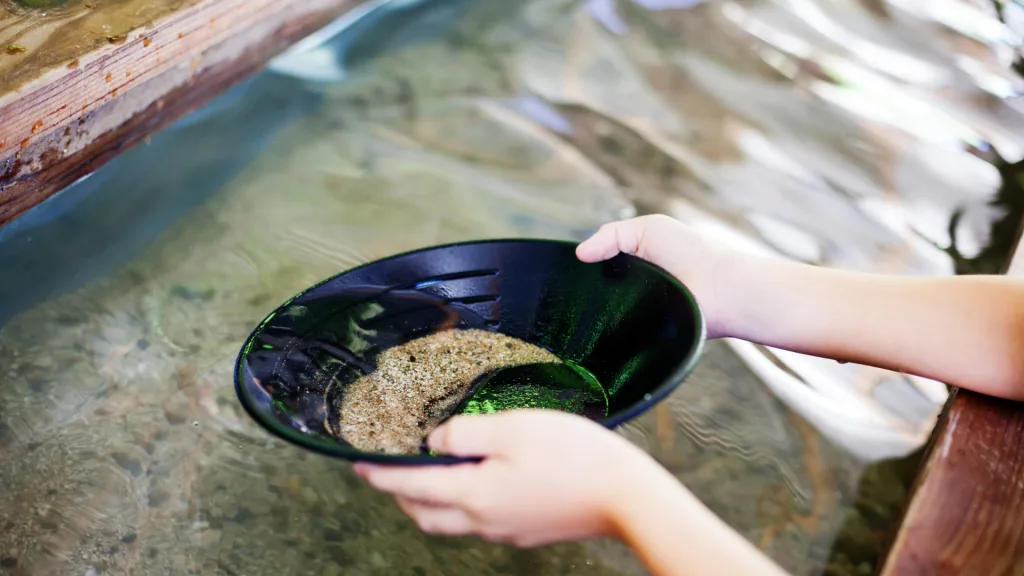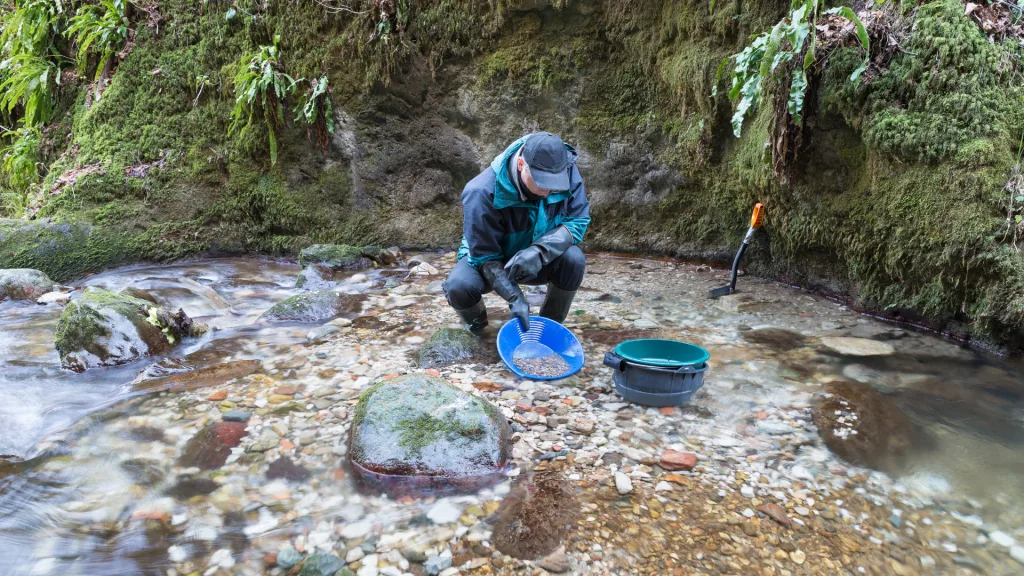Gold is often seen as a symbol of wealth and prosperity, and finding a nugget while exploring federal land can be a thrilling experience.
However, many people are unaware of the regulations surrounding this precious metal on government property. Whether you’re an amateur prospector or just curious about the rules, you need to stay on the right side of the law.
Today, we’ll help you figure out whether or not you’re in the clear to take your haul home.
Let’s mine!
How Is Gold Formed?
Gold is a dense, yellow metallic element valued for its beauty, rarity, and resistance to corrosion and tarnishing. It has the chemical symbol Au, and its atomic number is 79. The mineral is a good conductor of electricity and isn’t affected by air or water corrosion. This makes it a popular metal for jewelry, coins, and other decorative items.
It’s also used in various industrial applications, including electronics. However, before you take apart your electronics looking for this precious metal, it’s typically used in minimal amounts. In most cases, the minuscule amount isn’t worth your time, energy, or destroying your devices.
The natural process of forming it is known as “gold mineralization.” This takes place over millions of years. It can occur in various ways, but the most common type is hydrothermal. This is where hot water under the Earth’s crust moves the minerals into clumps which miners can find and extract.
This precious metal is one of the most abundant elements on Earth, but it’s relatively rare in its pure form. That makes it a valuable commodity. It’s widely recognized as a symbol of wealth and has been traded for thousands of years.
What Federal Land Can You Look for Gold on?
Looking for gold and other minerals on federal property can be tricky, especially if you want to do so legally. The Bureau of Land Management (BLM), the United States Forest Service (USFS), and the National Park Service (NPS) manage most public grounds.
In general, areas managed by NPS are going to be off-limits. However, that’s not generally the case with spaces managed by BLM and USFS.
Many BLM and USFS public lands are open to those hunting minerals. However, some exceptions exist, especially regarding wilderness areas and historic sites. In addition, it’s essential to familiarize yourself with federal, state, and local rules and regulations.
While gold is found all over the United States, there are currently 18 states with federally owned property available for prospecting. However, the most popular are Alaska, New Mexico, Colorado, Utah, Wyoming, Montana, Idaho, Nevada, Arizona, California, Oregon, and Washington.
Pro Tip: Unsure where to go to search for gold? We uncovered where you can Change Your Destiny in Rich Bar, California.

What Are the Rules for Recreational Gold Collecting on Federal Land?
Knowing the rules for recreational collecting is essential. You could find yourself in federal court if you’re not careful while collecting on federal land. Let’s examine the rules for the most common types of national territories.
USDA Forest Service
Most USFS areas are available for recreational panning and prospecting. You can enjoy this activity in national forests without authorization.
However, some wilderness areas don’t allow panning or metal detecting. While it’s generally legal, we recommend confirming the lawfulness and any unique rules before starting your search.
In addition, it’s important to note that removing rocks and other minerals shouldn’t disturb the terrain. Digging a small hole is acceptable, but anything further can require a Notice of Intent (NOI) from the governing agency.
Bureau of Land Management (BLM)
The BLM manages approximately 10% of all public grounds in the United States. Visitors can search for minerals using pans and metal detectors. However, any gold found on mining claims belongs to the holder.
If you want to avoid a heated confrontation, you need to make sure there’s not a mining claim where you’re searching. If there is and the owner catches you, it won’t be a fun experience.
National Park Service
You can enjoy many activities on acreage managed by the NPS. Unfortunately, collecting rocks and minerals isn’t one of them. The Code of Federal Regulation (36 C.F.R. § 2.1(a) and § 2.5(a)) prohibits these activities for both recreational and educational purposes. Exceptions to the code exist but are rare and not easy to acquire.
The only exceptions are in Whiskeytown-Shasta-Trinity National Recreational Area and some Alaska park units. However, there are strict rules and regulations regarding when, where, and how the collection can take place.
Pro Tip: Get the inside scoop on The (Many) Different Types of Public Land.

Can You Keep the Gold Found on Federal Land?
Generally, you can keep the gold you find on federal land. This assumes you legally collected it, and there’s no established claim for the area where you found it. In addition, there are limits regarding how much an individual can collect. It’s your responsibility to check rules and regulations specific to the area.
To keep anything you collect, you must avoid private mining claims. These may still be public areas, but an individual or business has filed paperwork with the Bureau of Land Management for the rights to mine it. Some claim owners allow collectors to hunt on their share, but for a fee. If you don’t have permission, don’t search for or take anything from a claimed area.
What Is the Most Effective Way to Find Gold?
Commercial setups for finding gold can be robust and complex. On the other hand, recreational miners can succeed using some basic tools. For example, you can start panning in a creek with nothing more than a pan and a shovel. Seriously, it’s that simple! Get permission before tromping through a creek or stream with your gear, or you could face serious legal trouble.
Another effective way to find minerals is to use a metal detector. Gold is a metal, and most metal detectors can detect it. However, it has a very low conductivity, so you’ll need high-quality gear. While we don’t recommend going into old mines, you might have some luck searching the surrounding area.
You can use a handful of other effective methods, but they typically require more experience and tools. For example, a dry washer is excellent for areas with little or no water. But these are bulky, can cost several hundred dollars, and may not be the best option for those with little to no experience.
Don’t Strike Gold Before You Do Your Research
While finding gold on federal land can be exciting, you must ensure you do so legally. Take the time to research the rules and regulations for the area. Contact the management agency’s local office when in doubt.
Typically, ignorance isn’t an excuse or defense when violating these rules and regulations. So research before you go and learn when you can and can’t keep the minerals you find on public land.
Discover the Best Free Camping Across the USA
To be honest with you, we hate paying for camping. There are so many free campsites in America (with complete privacy).
You should give it a try!
As a matter of fact, these free campsites are yours. Every time you pay federal taxes, you’re contributing to these lands.
Become a FREE CAMPING INSIDER and join the 100,000 campers who love to score the best site!
We’ll send you the 50 Best Free Campsites in the USA (one per state). Access the list by submitting your email below: